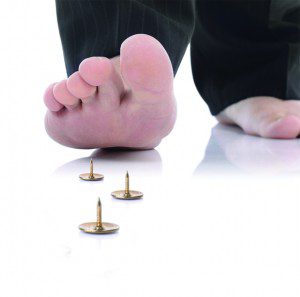 Diabetic peripheral neuropathy (DPN) is a type of nerve damage caused by chronically high blood sugar and diabetes. It leads to numbness, loss of sensation, and sometimes pain in your feet, legs, or hands. It is the most common complication of diabetes.
Diabetic peripheral neuropathy (DPN) is a type of nerve damage caused by chronically high blood sugar and diabetes. It leads to numbness, loss of sensation, and sometimes pain in your feet, legs, or hands. It is the most common complication of diabetes.
About 60% to 70% of all people with diabetes will eventually develop some level of peripheral neuropathy, although not all suffer pain. Yet this nerve damage is not inevitable. Studies have shown that people with diabetes can reduce their risk of developing nerve damage by keeping their blood sugar levels as close to normal as possible.
Peripheral neuropathy is the most common form of diabetic neuropathy. What causes peripheral neuropathy? Chronically high blood sugar levels damage nerves not only in your extremities but also in other parts of your body. These damaged nerves cannot effectively carry messages between the brain and other parts of the body. Your feet and legs are often affected first, followed by your hands and arms. Signs and symptoms of peripheral neuropathy are often worse at night, and may include:
• Numbness or reduced ability to feel pain or temperature changes
• A tingling or burning sensation
• Prickling
• Pins and needles sensation
• Sharp pains or cramps
• Increased sensitivity to touch — for some people, even the weight of a bed sheet can be agonizing
• Muscle weakness
• Loss of reflexes, especially in the ankle
• Loss of balance and coordination
• Serious foot problems, such as ulcers, infections, deformities, and bone and joint pain
Diagnosis
Doctors diagnose neuropathy on the basis of symptoms and a physical exam. During the exam, the doctor may check blood pressure, heart rate, muscle strength, reflexes, and sensitivity to position changes, vibration, temperature, or light touch.
Foot Exams
• Your health care provider should look at your feet at each office visit to check for injuries, sores, blisters or other problems.
• As a reminder, take off your shoes and socks when you’re in the exam room.
• Have a complete foot exam once a year. If you already have foot problems, have your feet checked more often. A complete foot exam includes a check of the skin on your feet, your foot muscles and bones, and your blood flow. Your provider will also check for numbness in your feet by touching your foot with a monofilament. It looks like a stiff piece of nylon fishing line or a bristle in a hairbrush.
• Other ways to check your nerves include using a tuning fork. It may be touched to your foot to see if you can feel it moving
Nerve Conduction Studies and Electromyography (EMG)
• If the doctor thinks you might have nerve damage, you may have tests that look at how well the nerves in your arms and legs are working. Nerve conduction studies check the speed with which nerves send messages. An EMG checks how your nerves and muscles work together.
Treatment
To treat nerve damage, you will need to keep
your blood glucose levels in your target range,
manage your pain and protect your feet.
Many people get depressed when they have nerve
damage and may need medication for depression as well as counseling.
Medications
Medications to relieve pain and reduce burning, numbness and tingling are available. Some of these are known for their use in other conditions but they still seem to help those with nerve damage.
Speak with your doctor to find out what treatments are best for you. Ask your doctor about clinical research studies focusing on DPN.
Hope through Research
The National Institute of Diabetes and Digestive and Kidney Diseases (NIDDK) conducts and supports research to help people with diabetes.
Participants in clinical trials can play a more active role in their own health care, gain access to new research treatments before they are widely available, and help others by contributing to medical research. For information about current studies, visit www.ClinicalTrials.gov or www.clinicalstudycenter.com.
Volunteering for a clinical study enables you to take an active role in your own health, while helping others with your condition as well!
NOW ENROLLING!
Clinical Study for Patients with Diabetic Peripheral Neuropathy
The Clinical Study Center of Fort Myers is seeking volunteers for participation in a clinical research study to evaluate the effectiveness and safety of an investigational DPN medication. If you are 18 years of age or older with diabetes, you may be eligible to participate.
Qualified participants will receive at no cost study-related:
• Evaluations, physical exams, routine lab work
• study medication
Compensation for time and travel will be available for the study.
Participants who qualify and complete the study can earn $50 per study visit. No medical insurance is necessary. Contact the Clinical Study Center today to find out more information on this DPN study.
Call the Clinical Study Center today to enroll in the Diabetic Peripheral Neuropathy study or to learn about current and upcoming clinical studies that you might qualify for.
Call 239-936-4421 Today!
13670 Metropolis Ave. Ste. 105
Fort Myers, Fl 33912










